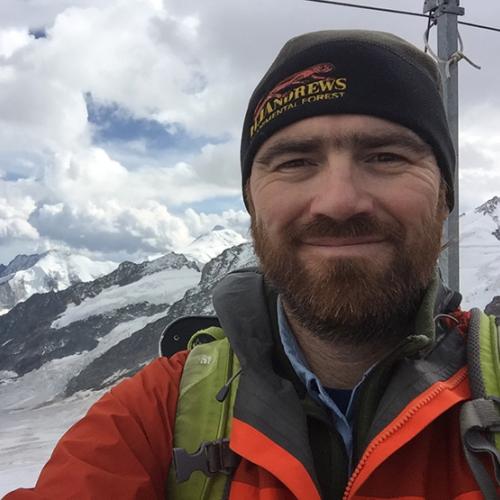
Still, Chris
- Biogeography
- Ecophysiology
- Ecosystem Ecology
My research is centered on forests and climate change feedbacks and impacts, on linkages between the carbon and water cycles at multiple spatial and temporal scales, and on the global biogeography and biogeochemistry of C4 grasses. My group uses a variety of measurement and modeling approaches for this research, including thermal imaging, deployment of microclimate and physiological sensors, and ecological and physiological process modeling.
- FES 595Ecosystem Processes: Models and Measurements
- FES 505/605Global Forest Ecology and Climatology
- FES 561Woody Plant Ecophysiology
- FES 399Scientific Methods for Analyzing Natural Resource Problems
Carbone, M. S., Richardson, A. D., Berkelhammer, M., Boot, C. M., Simonpietri, A., & Still, C. J. (2023). Interannual precipitation controls on soil CO2 fluxes in high elevation conifer and aspen forests. Environmental Research Letters, 18(12), 124009.
Gauthey, A., Bachofen, C., Deluigi, J., Didion‐Gency, M., D'Odorico, P., Gisler, J., Mas, E., Schaub, M., Schuler, P., Still, C.J. & Tunas, A. (2023). Absence of canopy temperature variation despite stomatal adjustment in Pinus sylvestris under multidecadal soil moisture manipulation. New Phytologist, 240(1), pp.127-137.
Li, B., Good, S. P., Fiorella, R. P., Finkenbiner, C. E., Bowen, G. J., Noone, D. C., Still, C.J. & Anderegg, W. R. (2023). Stable isotopes contain substantial additive information about terrestrial carbon and water cycling. Environmental Research Letters, 18(9), 094065.
Guo, Z., Zhang, K., Lin, H., Majcher, B. M., Lee, C. K., Still, C. J., & Wu, J. (2023). Plant canopies exhibit stronger thermoregulation capability at the seasonal than diurnal timescales. Agricultural and Forest Meteorology, 339, 109582.
Kibler, C. L., Trugman, A. T., Roberts, D. A., Still, C. J., Scott, R. L., Caylor, K. K., ... & Singer, M. B. (2023). Evapotranspiration regulates leaf temperature and respiration in dryland vegetation. Agricultural and Forest Meteorology, 339, 109560.
Still, C. J., Sibley, A., DePinte, D., Busby, P. E., Harrington, C. A., Schulze, M., ... & Page, G. F. M. (2023). Causes of widespread foliar damage from the June 2021 Pacific Northwest Heat Dome: more heat than drought. Tree Physiology, 43(2), 203-209.
Still, C. J., Page, G., Rastogi, B., Griffith, D. M., Aubrecht, D. M., Kim, Y., ... & Richardson, A. D. (2022). No evidence of canopy-scale leaf thermoregulation to cool leaves below air temperature across a range of forest ecosystems. Proceedings of the National Academy of Sciences, 119(38), e2205682119.
Keen, R. M., Voelker, S. L., Wang, S. Y. S., Bentz, B. J., Goulden, M. L., Dangerfield, C. R., ... & Still, C. J. (2022). Changes in tree drought sensitivity provided early warning signals to the California drought and forest mortality event. Global Change Biology, 28(3), 1119-1132.
Anderegg, L. D., Griffith, D. M., Cavender‐Bares, J., Riley, W. J., Berry, J. A., Dawson, T. E., & Still, C. J. (2022). Representing plant diversity in land models: An evolutionary approach to make “Functional Types” more functional. Global change biology, 28(8), 2541-2554.
Sibley, A., Schulze, M., Jones, J., Kennedy, A., & Still, C. (2022). Canopy wetting patterns and the determinants of dry season dewfall in an old growth Douglas-fir canopy. Agricultural and Forest Meteorology, 323, 109069.
Rastogi, B., Schmidt, A., Berkelhammer, M., Noone, D., Meinzer, F. C., Kim, J., & Still, C. J. (2022). Enhanced photosynthesis and transpiration in an old growth forest due to wildfire smoke. Geophysical Research Letters, e2022GL097959.
Still, C.J., Rastogi, B., Page, G.F., Griffith, D.M., Sibley, A., Schulze, M., Hawkins, L., Pau, S., Detto, M. and Helliker, B.R., 2021. Imaging canopy temperature: shedding (thermal) light on ecosystem processes. New Phytologist, 230(5), 1746-1753.
Still, C.J., Powell, R., Aubrecht, D., Kim, Y., Helliker, B., Roberts, D., Richardson, A., and M.L. Goulden. 2019. Thermal imaging in plant and ecosystem ecology: applications and challenges. Ecosphere 10(6).
Voelker, S.L., Merschel, A.G., Meinzer, F.C., Ulrich, D.E., Spies, T.A. and C.J. Still. 2019. Fire deficits have increased drought sensitivity in dry conifer forests: Fire frequency and tree‐ring carbon isotope evidence from Central Oregon. Global Change Biology, 25(4), pp.1247-1262.
Pau, S., Detto, M., Kim, Y., and C.J. Still. 2018. Tropical forest temperature thresholds for gross primary productivity. Ecosphere 9 (7), e02311.
Greer, B. T., Still, C., Cullinan, G. L., Brooks, J. R., & Meinzer, F. C. 2017. Polyploidy influences plant–environment interactions in quaking aspen (Populus tremuloides Michx.). Tree Physiology, 1-11.
Baguskas, S.A., Still, C.J., Fischer, D.T., D’Antonio, C.M., and J.Y. King. 2016. Coastal fog during summer drought improves the water status of sapling trees more than adult trees in a California pine forest. Oecologia, DOI: 10.1007/s00442-016-3556-y.
Greer, B. Still, C.J., Tague, C., Roberts, D., and G. Howe. 2016. Populations of aspen (Populus tremuloides Michx.) with different evolutionary histories differ in their climate occupancy. Ecology and Evolution, DOI: 10.1002/ece3.2102.
Williams, A.P., Schwartz, R.E., Iacobellis, S., Seager, R., Cook, B.I., Still, C.J., Husak, G. and J. Michaelsen. 2015. Urbanization causes increased cloud-base height and decreased fog in coastal southern California. Geophysical Research Letters, DOI: 10.1002/2015GL063266
Still, C.J., Pau, S. and E.J. Edwards. 2014. Land surface skin temperature captures thermal environments of C3 and C4 grasses. Global Ecology & Biogeography, DOI:10.1111/geb.12121.